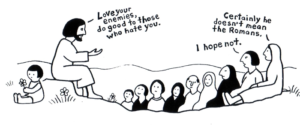Worship Guide for February 23, 2025
Like TV Guide, but from God! Find the text of the Prayers of the People and Sermon below. Use the buttons provided to find other worship materials.
To see the Worship Guide for other weeks, click here.
Prayers
Weekly Prayer List Recording:
Prayers of the People (Sunday):
7 Epiphany
23 February 2025
The response to the bidding, “Lord,” is “Hear us”
Lord in time and space – give us courage and persistence to hold fast to the hope that is within us in a world increasingly deaf to the values and expectations of your kingdom. Lord, Hear us.
We pray for the Church and her life: For Sean, Presiding Bishop, and Nicholas, our bishop; for Hosam, Archbishop of Jerusalem; for Pope Francis; for Bartholomew, Ecumenical Patriarch, and other Christian leaders. Lord, Hear us.
We pray for the world and its pressing needs: We continue to pray for the coming of peace with justice in the Middle East – remembering esp. Palestinian communities in Gaza and the West Bank. We continue to pray for a negotiated peace in Ukraine that honors a commitment to Ukrainian sovereignty and future self-determination. Lord, Hear us.
We pray for the nation: We pray for wisdom to perceive and courage to grasp the hidden opportunity in a time of crisis.
You are invited to bring your concerns to the Lord, either silently or aloud–
Among our myriad concerns, O Lord, we especially remember those working in government service and in public education;
We ask you to bless the Congress and the Courts in upholding the integrity of the Constitution. Lord, Hear us.
We remember the earth, our increasingly fragile island home. We pray for a strengthening of the emergency services and necessary infrastructure to meet the increasing challenge of climate instability. Lord, Hear us.
We pray for all in need and in any kind of trouble: for those whose strength is failing through ill health; whose spirits are flagging through depression; whose determination is being sapped through addiction; that they might know God’s comforting presence and healing. Lord, Hear us.
We remember with love those who have asked for our solidarity in prayer: Mary, Sam, John, Arline, Raya, Sara, Kevin, and others we name. Lord, Hear us.
We pray for our own needs, together with those nearest and dearest to us, remembering especially those celebrating birthdays this week; Judith Crowley, Jack Hegarty, Bob Shillaber, Sammi Tulungen, Mary Blake, and David Barrall. Lord, Hear us.
Rejoicing in the fellowship of so great a cloud of witnesses, we remember those we love but see no longer, especially those we name. We remember those experiencing loss.
Lord, Hear us.
Celebrant adds a concluding prayer.
An Unsatisfying Teaching
The Rev. Mark Sutherland
The experience of victimization – whether real or imagined – fosters the illusion that retaliation will provide satisfaction for past injury. This is the theme that the story of Joseph and his brothers and the teaching of Jesus in Luke’s Sermon on the Plain is timely – speaking into the dilemmas of our current time.
It’s Friday morning, a sunny but still bitterly cold morning. From my desk, I look out on the panorama of the houses and streets that, from North Main Street, climb College Hill to its apex crowned by the impressive verdigris dome of the Christian Science Church. I always think this an odd choice of architecture for a Christian Science church, yet like a great classical cathedral its dome dominates the horizon.
On this particular Friday morning, I am struggling to clear my head of the fog of the head cold – currently doing the rounds – that has laid me low since the previous Sunday. I’m daydreaming—casting around for inspiration to take me into a spiritual riff on the lectionary texts for the 7th Sunday after the Epiphany. This Friday morning feeling is familiar – the tension between despair at the task lying before me and a curiosity that stimulates my imagination sooner or later will provide the hook for my fresh engagement with the texts for the day.
Genesis 45 and Luke 6 address the tension between the golden rule of do unto others as you would have them do unto you and the law of retaliation do unto others as they have done unto you. A distinction lies in the inclusion or absence of four words that, insignificant in themselves, have the power to determine the course towards the promise of liberation from or the endless repetition of cycles of victimization and retaliation in individual and wider social relations.
From general observation, we can often see themes connecting the OT and the Gospel texts, which alert us to the particularity of God’s timely invitation. Between OT story and Gospel teaching, we find old themes reemphasized and given new impetus.
The experience of victimization – whether real or imagined – fosters the illusion that retaliation will provide satisfaction for past injury. This is the theme that the story of Joseph and his brothers and the teaching of Jesus in Luke’s Sermon on the Plain is timely – speaking into the dilemmas of our current time.
Joseph becomes an exemplar of the power of love – interpreted as the desire for reconciliation – to triumph over the impulse for retaliation. Joseph has every reason to hate his brothers for what they did to him. His brothers have every reason to fear his desire for revenge. Yet, having moved beyond his experience of being the victim allows Joseph to choose reconciliation over retaliation – thus breaking out of the repetitive cycle of victimization and retaliation.
Yet the story of Joseph and his brothers is nevertheless an ironic tale. At the heart of this story lies the irony that it is harder to be forgiven than punished for wrongdoing. The brothers are astonished and relieved having escaped Joseph’s retaliation. But this is not enough to free them from their expectation of retaliation – if not now, then later. Although they are seemingly forgiven, they are still left with the memory of having only narrowly avoided murdering their brother by selling him into slavery and deceiving their father with the lie of Joseph’s death in the claws and teeth of a lion. Until the end of the story, they remain in the grip of their expectation that revenge is the only response open to the victim. Proof that being the recipient of mercy -is, as Proverbs 25 says- akin to having hot coals poured over the head.
Jesus asks us to love our enemies and do good to those who hate us. He encourages us to turn the other cheek and to be self-sacrificial in our generosity – even at the risk of personal cost. He asks these things of us not because it’s the nice Christian thing to do – not to score some secret oneupmanship victory. Jesus is not exhorting us to the practice of a pious masochism that sentimentalizes turn the other cheek as the ultimate expression of passivity. He is showing us that this is the only way to step out of the cycle of victimization and retaliatory violence.
James Breech, in The Silence of Jesus, writes:
Jesus says, ‘…do good to those who hate you, bless those who curse you, pray for those who abuse you.’ And watch what happens. This is a recipe for destroying the little bundle of lies about myself and my society that came into existence the moment my tribe and I found somebody to hate. Following this injunction is not just a nice thing to do. It’s a matter of destroying the whole system of mystification which has been the womb in which [we’ve] lived and moved and had [our] social existence.
Love your enemies is the recipe for destroying the whole system of mystification – by which is meant the hatred of the other that forms the womb in which, to quote St Augustine, we live and move and have our being – that is, the culture of victimhood and retribution that permeates our social existence.
These days, many of us witnessing a severe attack on the Constitutional balance of power and the seemingly unstoppable descent into transactional authoritarianism with alarm and distress are asking the question, what does resistance look like? The unpalatable answer – unpalatable because it feels so unsatisfactory and so ineffectual- is Christian resistance. It means resistance shaped by Jesus’ teaching to love your enemies as the only way of breaking the cycle of victimization and retaliation – by which hatred of the other forms the womb in which we live and move and have our being.
Jesus calls us to follow him – to live lives well lived as the response to living under the weight of a coercive regime. Jesus calls us to embrace the power of exemplary actions undertaken by ordinary people – as opposed to fantasizing grand schemes of formal political action. He calls us to the resistance of the heart – the refusal to be coopted by feelings of powerlessness into responses of passivity and compliance. Likewise, he counsels against responding to violence with more violence. In addition to legitimate steps of political and legal protest, Jesus calls us to love our enemies as a reminder that –there are no small acts of resistance; any act by anyone has the potential of reverberating – of being absorbed and replicated, leading to meaningful change (Delia Popescu writing about Vaclav Havel the great Czech dissident and later President of a post-Communist Czechoslovakia).
Translated into our current political context, Jesus calls us to love our enemies as the primary form of effective resistance, requiring us to undergo a transformation of the human heart. This alone breaks the cycle of victimization and retaliation – the cycle of repetitive violence that has captured our social consciousness. In effect, when we cease seeing ourselves as victims, we not only take back our power but also break the grip that the desire for retaliation holds in our hearts.
At the deepest level, Jesus is asking us to give up being afraid – to give up seeing ourselves as helpless victims and, in the words of the late John O’Donohue, to have the courage today to live the life that we would love and to waste our hearts on fear no more (John O’Donohue, Morning Offering).





